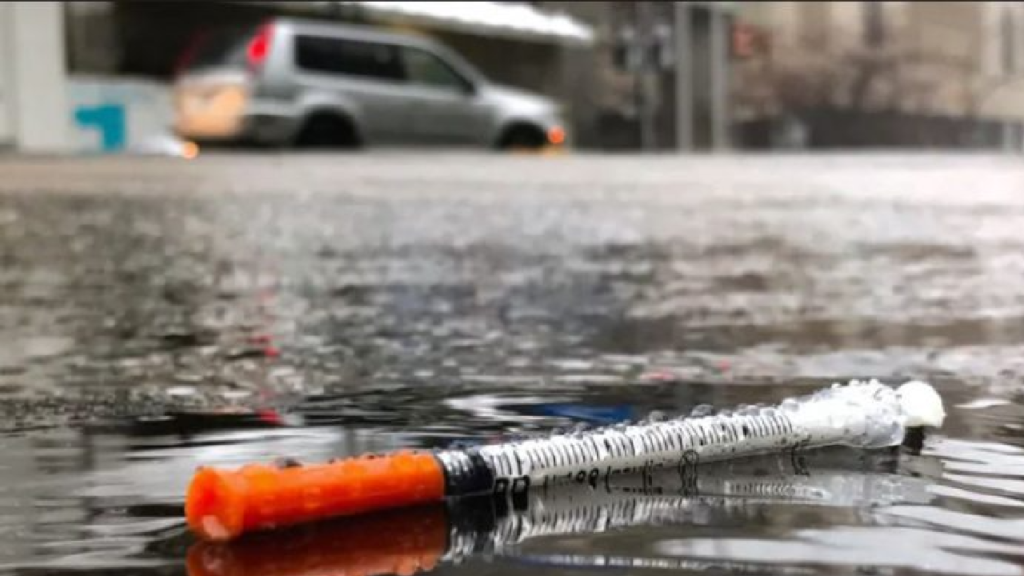
A death review panel report that examined more than 6,000 fatal overdoses in B.C. is urging the provincial government to rapidly create policy that allows for the distribution of a safer supply of drugs.
According to the report, released Wednesday, there were a total of 6,007 deaths due to illicit drug toxicity between Aug. 1, 2017 and July 31, 2021, while more than 8,700 people have died since the public health emergency was declared in April 2016.
Issued by chief coroner Lisa Lapointe’s office, the report notes that the deaths were not limited to those in poor inner-city urban areas but occurred throughout the province, amongst all socio-economic groups and that many of those who died frequently accessed medical services prior to death. It also notes that the primary driver of increased deaths has been the growing toxicity and unpredictability of the street supply of drugs.
“Illicit drug toxicity is the leading cause of unnatural death in the province, accounting for more deaths than homicides, suicides, motor vehicle incidents (MVIs), drownings and fire-related deaths combined. Deaths due to illicit drug toxicity are second only to cancers in terms of potential years of life lost in B.C. Many of these deaths were preventable,” reads the report.
Citing poverty and unstable housing as top factors among those dealing with drug addiction, the report says the eligibility criteria must be identified that lower barriers to obtaining a range of medical alternatives to toxic drugs. It says those criteria must be adopted by practitioners in all health authorities, where better access to care — including for those also struggling with mental health issues — is also needed.
The report also includes a handful of recommendations and measures that can be taken to address the illicit drug toxicity issue. It recommends the B.C. government develop a policy by May 9 that allows for the distribution of a safer supply of drugs and provides better health supports.
“Current regulatory requirements present a barrier to the provision of care to those who are at immediate risk of death from the toxic illegal drug supply. As the drug supply has become more toxic, lower barrier access to a safer supply has become more pressing,” the report states.
It also urges B.C. to create an action plan outlining steps taken over 30, 60 and 90 days and calls on the Ministry of Mental Health and Addictions, the Health Ministry as well as all health authorities to join forces in rapidly expanding access to a safer supply of drugs across the province, including in rural and Indigenous communities.
“Without broader changes to public policy, as well as increases to currently limited substance services, people who use drugs will still face harms related to criminalization and stigma which limits their ability to access already scarce treatment and recovery services,” the report says.
“The provincial response to the COVID-19 public health emergency has demonstrated that urgent action, co-ordinated efforts, and new ways to approaching complex problems are possible and impactful,” it adds.

Source: BC Coroners Service Death Review Panel: A Review of Illicit Drug Toxicity Deaths March 9, 2022 report.
Sheila Malcolmson, Minister of Mental Health and Addictions, said in a statement that even though the province has made efforts to deal with the situation, the report shows there is clearly more work to be done.
“This report confirms the urgency of the work underway by our government. Specifically, it calls on government to build an evidence-based continuum of care to deliver mental-health and substances services, including safer supply. And that is exactly what our government is doing,” she said, adding. “There is more to do along the entire continuum of care to end the poisoned drug crisis, including treatment and recovery, harm reduction and mental-health supports. We won’t stop working until we turn this crisis around.”
Dean Wilson, who leads a peer facilitator program for the BC Centre on Substance Use and is a longtime drug user activist in Vancouver, said the Mental Health and Addictions Ministry has lacked funding and clout and should have been working with the Health Ministry all along.
“I’m really angry, and I’m incredibly frustrated,” he said, adding the distribution of a safer supply of drugs should have been prioritized long ago as overdose deaths reached record numbers during the pandemic.
Last month, the coroners service reported that 2,224 people died last year from suspected overdoses, a 26 per cent jump over the previous year.
Wilson said there’s been a lack of recognition that drug users will seek out substances wherever they can due to the nature of addiction and that deaths from fentanyl and other opioids will continue if safer alternatives are not provided.
Not all drug users want treatment, and those who have sought it have been disappointed because of the long wait for beds following detox, he said.
“In that time, you’re usually back to where you were if you have to wait 20 days. They should go right from a detox immediately into treatment, if that’s what they want. We’ve been telling them that’s been a gap forever.”
The full report can be viewed here.
With files from the Canadian Press




